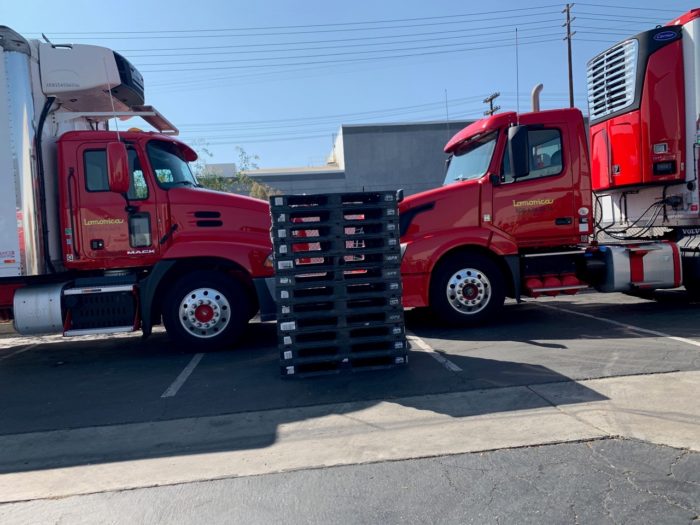As supply chains grow more complex, shipments of U.S. goods are expected to accelerate 23.5 percent by 2025. Due to increased freight activities, the environmental impact of logistics will invariably contribute to rising greenhouse gas (GHG) emissions. As a result, businesses are seeking ways to reduce their supply chain carbon footprint and create an environmentally-friendly brand while saving on fuel and transportation costs. This is one reason why supply chain managers seek to create more circular and efficient supply chains.
How Businesses Can Reduce the Environmental Impact of Logistics

Sustainable product transportation challenges companies that are trying to reduce the environmental impact of their logistics operations. While emission-free electric semi-trailers could be transformative for the industry, it will be years before they are deployed widely. In the meantime, logistics managers must explore available technologies and devise innovative strategies to reduce carbon emissions. The following considerations can help logistics managers reduce the environmental impact of their supply chains:
Optimizing Routes
By selecting the shortest and the most cost-efficient route to source raw materials or deliver goods, companies can reduce transit time and lower fuel costs. Route optimization software can analyze critical logistics issues such as vehicle availability, traffic conditions, and labor availability for loading and unloading. With automated route planning, logistics operations can optimize and streamline routes to reduce carbon emissions.
Tracking Empty Miles
Often, transport vehicles return empty after delivering products or materials to their destinations. The freight industry estimates that empty miles account for around 20 percent of transport miles. Empty miles are substantially higher for interstate freight carried out by heavy trucks with box trailers. These empty miles offer no returns on fuel expenses or drivers’ wages. Further, empty miles impact the environment through GHG emissions. By increasing transparency in logistics through a track and trace system, empty miles can be avoided. RFID tracking solutions are an effective way to increase the visibility of individual shipments in logistics.
Maximizing Product Loads Per Shipment
By optimizing a vehicle’s load capacity, logistics managers can increase the cost-effectiveness of each transportation leg. And while increasing the product load may decrease the average fuel mileage of trucks, logistics managers have found savings by ensuring maximum product loads travel per vehicle. Additionally, by reducing the individual weight of product packages and shipping platforms, logistics managers have realized even greater savings.
Though shipping pallets are often one of the most overlooked components in a supply chain, they can prove instrumental in reducing the environmental impact of logistics.
Though shipping pallets are often one of the most overlooked components in a supply chain, they can prove instrumental in reducing the environmental impact of logistics. Commonly used wood pallets that weigh around 65-75 pounds contribute significantly to increasing the overall weight of shipments during transport and reducing the number of actual products shipped. Likewise, more fuel is required for each transportation leg. And the flimsy structure of wood pallets is not cost-effective for the implementation of RFID tracking solutions. Logistics managers have found one answer to these concerns in plastic pallets—a cost-effective and sustainable alternative to wood pallets that can lower the environmental impact of logistics operations.
Using Plastic Pallets to Make Supply Chains More Sustainable
 Plastic pallets are up to 35 percent lighter than wood block pallets. This is critical when optimizing the weight capacity of transport vehicles. Not only is plastic pallet weight consistent and unaffected by moisture and humidity, plastic pallets have the following benefits that make them ideal for sustainable logistics operations:
Plastic pallets are up to 35 percent lighter than wood block pallets. This is critical when optimizing the weight capacity of transport vehicles. Not only is plastic pallet weight consistent and unaffected by moisture and humidity, plastic pallets have the following benefits that make them ideal for sustainable logistics operations:
- Unibody construction: Unlike wood pallets, plastic pallets have unitized construction and are devoid of loose boards or stray splinters. This makes them cost-effective for pallet-level tracking using RFID chips. RFID tags embedded in plastic pallets ensure readability when products move across the supply chain.
- Recyclability: On average, wood pallets make 15-20 trips before they reach a landfill. On the other hand, plastic pallets can make as many as 100 trips before being ground down and recycled into “new” pallets.
- Pallet Pooling: The unmatched durability of plastic pallets make them uniquely suitable for pallet pooling. By renting pooled plastic pallets, businesses can save the cost of owning and maintaining a fleet of pallets.
In today’s complex and fast-moving supply chains, it is impossible to reduce the environmental impact of logistics to zero. However, plastic pallets can help supply chains become more circular and efficient and enable businesses to reduce transport carbon emissions while decreasing costs incurred in logistics operations.
With recyclable iGPS plastic pallets, you can create an eco-friendly supply chain that not only improves your profit margin but also reduces the environmental impact of logistics operations. To learn more about how to make your supply chain economically and environmentally sustainable, give our team a call at 1-800-884-0225, email a specialist at switch@igps.net, or visit our contact page.



